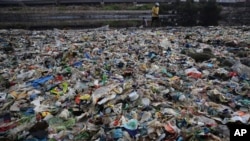Floating trash speckles the world’s oceans, some of which are running low on fish. Now China, a source of those problems and dominant force in several Asian maritime sovereignty disputes, indicates it will work with other countries to improve those seas.
Analysts believe the offers would help China bolster its image among other countries, particularly weaker ones in Asia. States that feel threatened by China sometimes get help from Beijing’s rival Washington.
Chinese President Xi Jinping recommended October 15 speeding up “innovation” in marine technologies and creating “blue partnerships” among countries, the state-run China Daily news website said. Xi stressed improvements in stopping ocean-borne pollution and protecting species — as well as developing resources.
The president’s remarks in a message to the 2019 China Marine Economy Expo in the southern Chinese port city Shenzhen follow a series of other missions to improve China’s image, especially in Asia, the scholars say.
“China approaches things using all tools and all means possible, from hard power to soft power to diplomacy,” said Eduardo Araral, associate professor at the National University of Singapore’s public policy school. Southeast Asian countries irked by Chinese challenges to their maritime claims would welcome joint pollution control, he added.
“This recent pronouncement is within that spectrum of cooperation, and I think it should be welcomed because it recognizes that other countries in Southeast Asia bordering the South China Sea have legitimate interests in terms of the resources,” Araral said.
Global fisher, polluter
China has the world’s largest distant-water fishing operations with 2,500 vessels ranging as far as Argentina, the advocacy group Global Fishing Watch estimates. More Chinese vessels ply the exclusive economic zones of other countries where they sometimes take advantage of weak enforcement.
In Asia, Chinese fishing craft have turned up in waters claimed by Indonesia, Malaysia and the Philippines.
China’s 6-year-old, $1 trillion Belt and Road campaign to foster Eurasian trade routes by building infrastructure, has raised fears of environmental damage, the research nonprofit Environmental and Energy Study Institute said in 2018. The Belt and Road initiative includes a maritime route from China westward past Somalia into the Mediterranean Sea.
That criticism will prompt China to strive for keeping its international maritime expansion clean, said Yun Sun, East Asia Program senior associate at the Stimson Center think tank in Washington.
“We do see, for example, the Chinese are being criticized for their distant water fishing, and they are being criticized for creating pollution, creating projects that are not environmentally friendly along the maritime Silk Road,” Sun said. The seas, she added, are “one area that the Chinese have raised as a priority for the Belt-and-Road development, so I would not be surprised to see more policy.”
Political pressures
Asia countries resent China for perceived intrusions into their waters more than any environmental threats.
Beijing has upset six other governments since 2010 by landfilling small islets in the contested South China Sea for military use. Claims by Brunei, Malaysia, Taiwan Vietnam and the Philippines all overlap those of China in the 3.5 million-square-kilometer waterway. China calls about 90% of the sea its own.
Beijing began trying in 2016 to improve relations with other South China Sea claimants, after it lost a world arbitration ruling to the Philippines.
“They want to promote scientific research on [the] South China Sea,” said Lin Chong-pin, a retired strategic studies professor in Taiwan.
Overseas impressions of China have improved already due to the Belt and Road initiative, he said. “I have not seen China mentioning other oceans, for fear of being interpreted as expansionist,” he added.
Last year Chinese officials offered to share weather station data from the sea’s disputed Spratly Islands with other countries. In September China sent a naval training ship through the sea and beyond to make friendly ports of call.
Asian governments such as Taiwan and the Philippines have turned to the United States for help in resisting China militarily. Washington periodically sends naval ships into the South China Sea to urge that Beijing keep it open internationally.
What else China can do at sea
“Green financial system” guidelines developed by six Chinese ministries in 2016 could eventually generate loans for Belt-and-Road projects, China Daily says. The news website calls that outcome a “long-term but achievable goal.”
China could feasibly help Indonesia rid plastic trash from its territorial waters, Sun suggested as a likely type of project. Indonesia is the world’s largest contributor to ocean plastics after China, the World Economic Forum says.
Other Sino-foreign tie-ups might help stop overharvesting of fisheries or lead to research on joint resource development, Araral said. Southeast Asian maritime states will welcome China’s overtures if not asked to give up sovereignty claims, he said.









